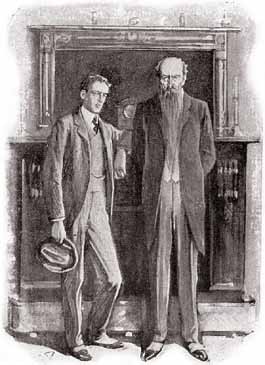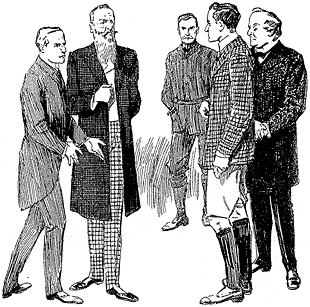| プライオリスクール 3 | プライオリスクール 4 |
That evening found us in the cold, bracing atmosphere of the Peak country, in which Dr. Huxtable’s famous school is situated. It was already dark when we reached it. A card was lying on the hall table, and the butler whispered something to his master, who turned to us with agitation in every heavy feature. | その夜我々はピーク地方の冷えたすがすがしい大気の中にいた / ハクスタブル博士の有名な学校が建っている◆我々が学校に到着する頃には既に暗くなっていた◆ホールのテーブルに名刺が置かれていた / そして執事が何かを校長に耳打ちした / 彼は顔中に動揺を表して我々の方を見た |
“The Duke is here,” said he. “The Duke and Mr. Wilder are in the study. Come, gentlemen, and I will introduce you.” | 「公爵がこちらにみえています」 / 彼は言った◆「公爵とワイルダー氏は書斎です◆来てください / あなたを紹介します」 |
I was, of course, familiar with the pictures of the famous statesman, but the man himself was very different from his representation. He was a tall and stately person, scrupulously dressed, with a drawn, thin face, and a nose which was grotesquely curved and long. His complexion was of a dead pallor, which was more startling by contrast with a long, dwindling beard of vivid red, which flowed down over his white waistcoat, with his watch-chain gleaming through its fringe. Such was the stately presence who looked stonily at us from the centre of Dr. Huxtable’s hearthrug. Beside him stood a very young man, whom I understood to be Wilder, the private secretary. He was small, nervous, alert, with intelligent light-blue eyes and mobile features. It was he who at once, in an incisive and positive tone, opened the conversation. | 私は / 当然 / この有名な政治家の肖像画を良く見ていた / しかし実際に見ると彼は肖像画とは非常に異なっていた◆彼は背の高い威厳のある人物で / 几帳面に服を調え / やつれた、細い顔で / 鼻は異様なまでに彎曲し長かった◆彼の顔色は極端に青ざめ / それは余計にぎょっとさせるものだった / 長い先細の燃えるように赤い顎鬚との対比で / 白いベストの上に流れ落ちている / その縁に沿って時計の鎖がキラキラと輝いている◆このように堂々とした貫禄ある人物だった / 我々を冷酷に見つめていたのは / ハクスタブル博士の暖炉前の敷物の真中に立って◆彼の隣に非常に若い男が立っていた / 私が私設秘書のワイルダーだと理解した◆彼は背が低く / 神経質で / 用心深い / 知的な水色の目とよく動く顔の男だった◆彼だった / すぐに辛辣で積極的な口調で / 会話を始めたのは」 |
 | |
“I called this morning, Dr. Huxtable, too late to prevent you from starting for London. I learned that your object was to invite Mr. Sherlock Holmes to undertake the conduct of this case. His Grace is surprised, Dr. Huxtable, that you should have taken such a step without consulting him.” | 「今朝ここに来ました / ハクスタブル博士 / あなたがロンドンに行くのを止めるには遅すぎましたが◆私はあなたの目的がシャーロックホームズ氏を招くのだと知りました / この事件の捜査を引き受けてもらうために◆公爵は驚かれています / ハクスタブル博士 / 何の相談も無しにそんな措置をとってしまったことを」 |
“When I learned that the police had failed– –” | 「警察が失敗したと分かった時…」 |
“His Grace is by no means convinced that the police have failed.” | 「公爵は警察が失敗したとは全く思っておりません」 |
“But surely, Mr. Wilder– –” | 「しかし、確かに / ワイルダーさん…」 |
“You are well aware, Dr. Huxtable, that his Grace is particularly anxious to avoid all public scandal. He prefers to take as few people as possible into his confidence.” | 「よくご存知でしょう / ハクスタブル博士 / 公爵はどんな不名誉な噂でもおおやけになるのは避けたいと特に思っています◆公爵は可能な限り他の人間には秘密を明かさないのを好んでおられる」 |
“The matter can be easily remedied,” said the browbeaten doctor; “Mr. Sherlock Holmes can return to London by the morning train.” | 「事態は簡単に修復できます」 / おどおどした博士が言った / 「シャーロックホームズ氏は朝の列車でロンドンにお帰りいただくこともできます」 |
“Hardly that, Doctor, hardly that,” said Holmes, in his blandest voice. “This northern air is invigorating and pleasant, so I propose to spend a few days upon your moors, and to occupy my mind as best I may. Whether I have the shelter of your roof or of the village inn is, of course, for you to decide.” | 「それは無理です / 博士 / それは無理です」 / ホームズは言った / もっとも温和な声で◆「この北方の空気は爽快で心地よい / ですから私はこの荒野で数日過ごすつもりです / そして出来る限り専心するつもりです◆私があなたの所に泊まるか村の宿屋にするかは / もちろん / あなたが決めることですが」 |
I could see that the unfortunate doctor was in the last stage of indecision, from which he was rescued by the deep, sonorous voice of the red-bearded Duke, which boomed out like a dinner-gong. | 私は分かった / 不幸な博士が判断に困って絶体絶命になっているのが / そこから彼は救われた / 赤い顎鬚を生やした公爵の低い鳴り渡る声で / それは夕食の鐘のようにとどろいた |
“I agree with Mr. Wilder, Dr. Huxtable, that you would have done wisely to consult me. But since Mr. Holmes has already been taken into your confidence, it would indeed be absurd that we should not avail ourselves of his services. Far from going to the inn, Mr. Holmes, I should be pleased if you would come and stay with me at Holdernesse Hall.” | 「ワイルダー君と同じ意見だ / ハクスタブル博士 / 君が私に相談していたほうが賢明だったというのは◆しかしホームズ氏にはすでに打ち明けたのだから / これは不合理なことになるだろう / 私達があえて彼の力を借りないというのは◆宿屋などに泊まらずとも / ホームズ君 / 私は喜んで / ホールダネス館に来て泊まっていただきたい」 |
“I thank your Grace. For the purposes of my investigation, I think that it would be wiser for me to remain at the scene of the mystery.” | 「ありがとうございます、公爵閣下◆私の捜査のためには / その方が賢明だろうと考えています / 事件の現場に残るのが」 |
“Just as you like, Mr. Holmes. Any information which Mr. Wilder or I can give you is, of course, at your disposal.” | 「君の好きなようにしてくれ / ホームズ君◆私やワイルダー君が話すことはすべて / もちろん / 君の自由にしてよい」 |
“It will probably be necessary for me to see you at the Hall,” said Holmes. “I would only ask you now, sir, whether you have formed any explanation in your own mind as to the mysterious disappearance of your son?” | 「おそらく館であなたとお会いする必要が出てくるでしょう」 / ホームズは言った◆「今はただお尋ねしたい / あなた自身はすでに何か意見を持っているかどうか / ご子息の失踪事件について」 |
“No, sir, I have not.” | 「いや / ない」 |
“Excuse me if I allude to that which is painful to you, but I have no alternative. Do you think that the Duchess had anything to do with the matter?” | 「あなたにとって辛いことに触れるのは申し訳ないですが / しかし他に方法がありません◆あなたは奥さんがこの事件に何か関与しているとお考えですか?」 |
The great minister showed perceptible hesitation. | この偉大な閣僚は見て分かるほど躊躇した |
“I do not think so,” he said, at last. | 「そうは思わん」 / 彼は遂に言った |
“The other most obvious explanation is that the child has been kidnapped for the purpose of levying ransom. You have not had any demand of the sort?” | 「もう一つ、分かりやすい解釈は / 子供は身代金目的で誘拐されたというものです◆そういう要求は来ていますか?」 |
“No, sir.” | 「いや」 |
“One more question, your Grace. I understand that you wrote to your son upon the day when this incident occurred.” | 「もう一つ質問があります◆聞いたところでは / あなたはこの事件が起きた日に息子さんに手紙を書いています」 |
“No, I wrote upon the day before.” | 「いや、私が書いたのはその前の日だ」 |
“Exactly. But he received it on that day?” | 「その通りです◆しかし息子さんが受け取ったのはその当日ですね?」 |
“Yes.” | 「そうだ」 |
“Was there anything in your letter which might have unbalanced him or induced him to take such a step?” | 「あなたの手紙の中に何かありましたか / 息子さんお気持ちを乱すか、こんな手段に出るように仕向けるものが?」 |
“No, sir, certainly not.” | 「ない / 間違いなく、ない」 |
“Did you post that letter yourself?” | 「ご自分で投函されたのでしょうか?」 |
The nobleman’s reply was interrupted by his secretary, who broke in with some heat. | 公爵の返事は秘書によって中断された / 彼はすこし興奮して口を挟んだ |
 | |
“His Grace is not in the habit of posting letters himself,” said he. “This letter was laid with others upon the study table, and I myself put them in the post-bag.” | 「公爵にはご自分で郵便を投函するような習慣はありません」 / 彼は言った◆「その手紙は他の手紙と一緒に書斎のテーブルに置かれていて / 私がそれを郵便袋に入れたのです」 |
“You are sure this one was among them?” | 「その手紙が交ざっていたのは確かですか?」 |
“Yes, I observed it.” | 「ええ / 見ました」 |
“How many letters did your Grace write that day?” | 「その日、公爵は何通の手紙を書いたのでしょうか?」 |
“Twenty or thirty. I have a large correspondence. But surely this is somewhat irrelevant?” | 「20通か30通◆私はたくさんの人間と手紙のやりとりをしている◆しかし、明らかにちょっと的外れの質問では?」 |
“Not entirely,” said Holmes. | 「そうとも言えません」 / ホームズは言った |
“For my own part,” the Duke continued, “I have advised the police to turn their attention to the south of France. I have already said that I do not believe that the Duchess would encourage so monstrous an action, but the lad had the most wrong-headed opinions, and it is possible that he may have fled to her, aided and abetted by this German. I think, Dr. Huxtable, that we will now return to the Hall.” | 「私自身がやったことは」 / 公爵は続けた / 「私は警察に助言をした / 南フランスに注意を向けるように◆私は既に信じていないと言っている / 妻がそんな恐ろしい行動をけしかけたとは / しかし息子は非常に頑固な意見を持っていて / 彼が妻の所に逃げた可能性はある / このドイツ人の助けを借り、そそのかされて◆私は思う / ハクスタブル博士 / 我々はそろそろ館に戻ろうと」 |
I could see that there were other questions which Holmes would have wished to put, but the nobleman’s abrupt manner showed that the interview was at an end. It was evident that to his intensely aristocratic nature this discussion of his intimate family affairs with a stranger was most abhorrent, and that he feared lest every fresh question would throw a fiercer light into the discreetly shadowed corners of his ducal history. | 他の質問があったことは見て取れた / ホームズが質問したいと思っていた / しかし、公爵の無愛想な態度は示していた / この話が終わりになったことを◆これは明らかだった / 彼の強烈に貴族的な性格にとって / 最も内密の家族の出来事について見ず知らずの人間と話し合う事は / もっとも忌み嫌うものだったと / そして彼は恐れていた / 全ての新しい質問がさらに厳しい光を投げかけないかと / 彼が公爵の経歴の片隅に入念に隠していたものに対して |
| プライオリスクール 3 | プライオリスクール 4 |